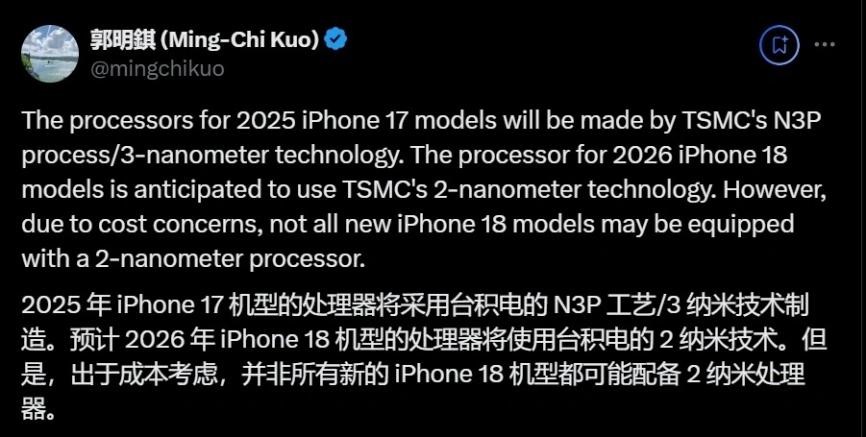In the highly competitive and rapidly changing semiconductor and smartphone industries, Apple once stood at the top of the industry with its outstanding innovation ability and unremitting pursuit of excellent product performance. Although Apple's innovation ability has been questioned in recent years, the pursuit of product performance is still obvious to all.
Recently, the forward-looking prediction of well-known analyst Ming-Chi Kuo, like a bombshell, once again focused the attention of the global technology community on the technological innovation that Apple will bring - according to its prediction, Apple's upcoming iPhone 17 series is expected to be equipped with TSMC's processor based on 3nm chip process, and what is more exciting is that some iPhone 18 models will be the first to enter the 2nm era, a milestone leap, It not only demonstrates Apple's profound heritage and forward-looking layout in the field of chip technology, but also deeply reflects the long-term close and efficient strategic partnership with TSMC.

Figure: Ming-Chi Kuo predicts that some iPhone 18 models will be the first to enter the 2nm era in 2026
1. 2nm chip technology: a new era of semiconductor technology
Every leap forward in semiconductor technology is accompanied by a significant reduction in the chip manufacturing process, and the arrival of 2nm process technology is undoubtedly another major leap in the field of semiconductor manufacturing. Compared with the widely used 5nm and even more advanced 3nm technology, the 2nm process has achieved a qualitative leap in transistor density, performance improvement, and power consumption reduction. This not only means that more transistors can be integrated per unit area, which significantly increases the computing power and data processing speed of the chip, but also effectively reduces the power consumption of the chip during operation through a more refined manufacturing process, bringing longer battery life to mobile devices such as smartphones. Apple's choice to use the 2nm chip on the iPhone 18 is undoubtedly a brave exploration and breakthrough of the future performance limits of mobile computing.
2. Apple and TSMC: A model of strong alliances
The cooperation between Apple and TSMC is a model in the semiconductor industry. Since the launch of Apple's self-developed chip strategy, TSMC has become an indispensable partner of Apple with its excellent manufacturing process and production capacity. From the initial A-series processors to the subsequent M-series chips, TSMC has always provided Apple with the most advanced chip process support to help Apple maintain its leading position in chip technology. Apple's plan to use the 2nm chip on the iPhone 18 is undoubtedly a high recognition and trust of TSMC's technical strength and innovation capabilities. The close cooperation between the two parties has not only promoted the continuous progress of semiconductor manufacturing processes, but also set a benchmark for technological innovation in the global smartphone industry.
3. The far-reaching impact of technological innovation on the smartphone industry
Apple's decision to adopt a 2nm chip on the iPhone 18 will have a profound impact on the entire smartphone industry. On the one hand, it will greatly promote the improvement of the performance-to-power ratio of smartphones, bringing users a smoother and more durable experience. On the other hand, it will also accelerate the technological follow-up and competition of other manufacturers in the industry, and promote the upgrading and optimization of the entire smartphone industry chain. At the same time, with the gradual maturity and popularization of 2nm chip technology, it will provide more solid hardware support for the application of smartphones in AI computing, high-definition cameras, 5G communications and other fields, and further expand the functional boundaries and application scenarios of smartphones.
4. Challenges and Opportunities: Future-Oriented Technology Prospects
However, the implementation of 2nm chip technology is not an easy task, and it faces many technical challenges and difficulties. This includes, but is not limited to, the stringent requirements of the production environment for more refined manufacturing processes, higher R&D investment and risks, and how to effectively control costs and power consumption while improving performance. But it is precisely these challenges that have stimulated the motivation and potential of the semiconductor industry to continue to innovate. For Apple and the industry as a whole, the arrival of the 2nm era is both a challenge and an opportunity. It requires enterprises to continuously increase R&D investment, strengthen technological innovation and talent training, and optimize supply chain management and production efficiency to cope with increasingly fierce market competition and technological change.
To sum up, Apple's decision to use 2nm chips on the iPhone 18 is not only an accurate prediction and positive response to the future development trend of smartphone technology, but also an important embodiment of Apple's strong alliance with TSMC to jointly promote the progress of semiconductor technology. With the gradual maturity and popularization of this technology, we have reason to believe that the smartphone industry will usher in a more brilliant and intelligent future.






